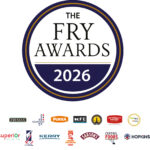Finney’s in Benllech, Anglesey, has proven that sustainability isn’t just good for the planet – it’s good for business too
When you run a fish and chip shop today, sustainability isn’t just a consideration, it’s a necessity. But when your business sits right by the sea, that responsibility feels even more important. That’s certainly the case for Finney’s in Benllech, located in the heart of Anglesey, a small island off the northwest coast of Wales. Benllech is home to one of the island’s most popular beaches, making the connection between the sea and sustainability impossible to ignore.
Owned by husband and wife team Carol and Mike Hulme, Finney’s has embraced its responsibility since opening in 2009. The pair’s dedication to sustainable practices earned them the prestigious Environment & Sustainable Business Award, sponsored by Seafood from Norway, at this year’s National Fish & Chip Awards.
For Carol, the motivation was clear from the start. “Our sustainability journey really started just with our expectations and the community’s expectations,” she explains. “Over the years, we saw the growing need to minimise our waste, reduce our carbon footprint, and source seafood responsibly. We’re in an industry that’s been here for generations, and we want to ensure it remains for future generations.”
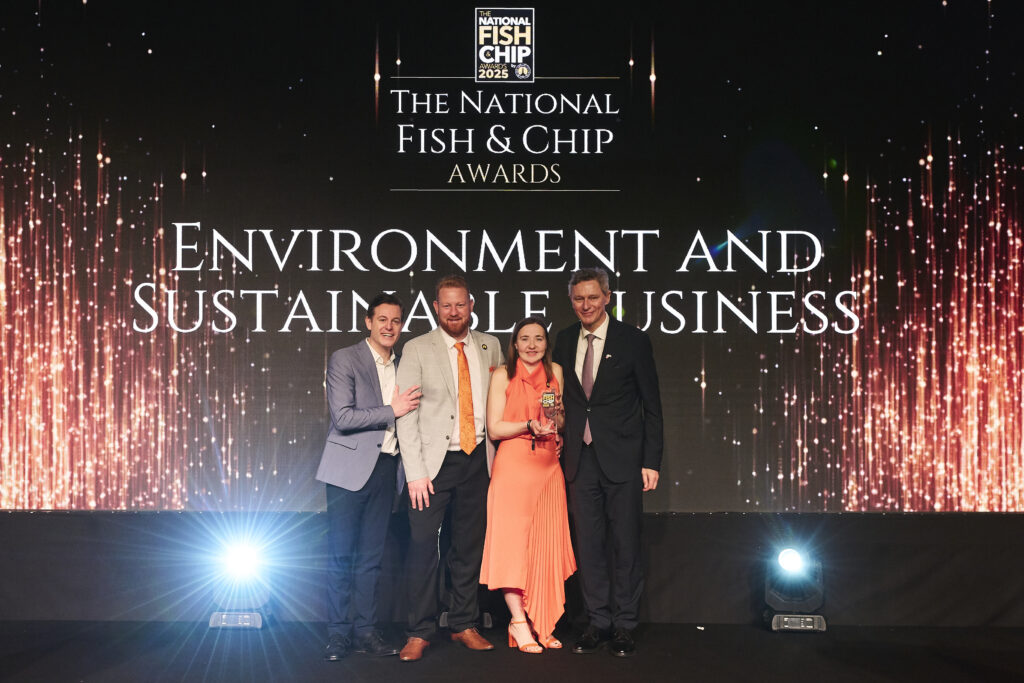
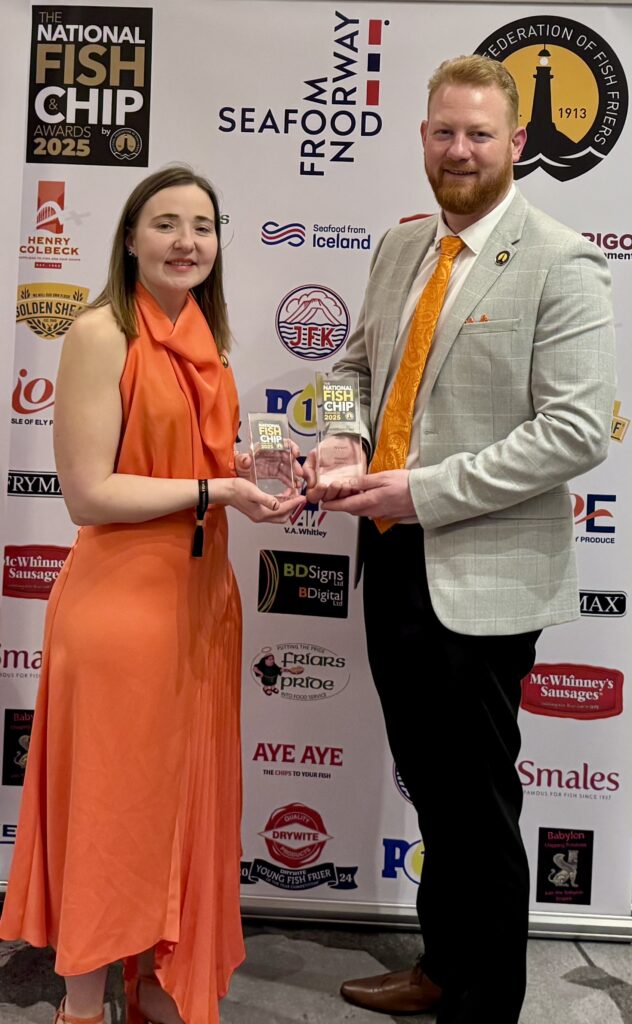
Simple changes
The pair began with simple changes – switching to sustainable packaging, properly separating waste, and ensuring that all fish sourced met Marine Stewardship Council (MSC) standards, even if they weren’t officially certified.
They also maintained early on that they wanted to be ahead of any legislation, preferring to be proactive rather than reactive. This saw plastic forks and polystyrene replaced with alternatives before it became mandatory. They also moved from plastic to paper bags which, under Welsh rules, they are obliged to charge 25p for. However, in line with their environmental commitments, reuse is encouraged with customers receiving 10p off their order every time they return with one. It’s an initiative that has resulted in an unexpected promotional opportunity for the chippy, as Carol explains: “We’ve had holiday cottages leave our reusable bags for guests with a note that if they reuse them at Finney’s, they get 10p off each time. It’s great promotion for us but it’s good for the holiday owner too as they are seen to be encouraging reusing, so it’s like a continuous chain.”
Just like with plastic forks, Finney’s introduced strict waste separation long before it became mandatory in Wales in April 2024. It has also installed grease traps to prevent fats, oils, and food waste from entering the drains – something not yet required but which Carol anticipates could become a future regulation. What’s more, all its cleaning products are eco-friendly and plant-derived, which means no nasties going down the drain, and packaged in bottles made from 100% recycled plastic.
Beyond staying ahead of the curve, Carol believes there is a financial incentive to spearheading such changes, explaining: “There’s a difference between spending money on something because you’re required to and choosing to invest in it yourself. It feels better coming out of your pocket, I think, when it’s your decision, rather than an obligation.”
Reducing food waste is another area the couple have been keen to make improvements in, repurposing leftovers where they can. “We don’t waste any fish,” Carol explains. “We cut it to our own size, and any trims are made into goujons for kids’ meals or fishcakes. If we make too much, we freeze and sell them in our fresh fish shop which we have across the road.”
Their sustainability ethos extends to peas too. If they have any leftover, they are turned into pea fritters and frozen.
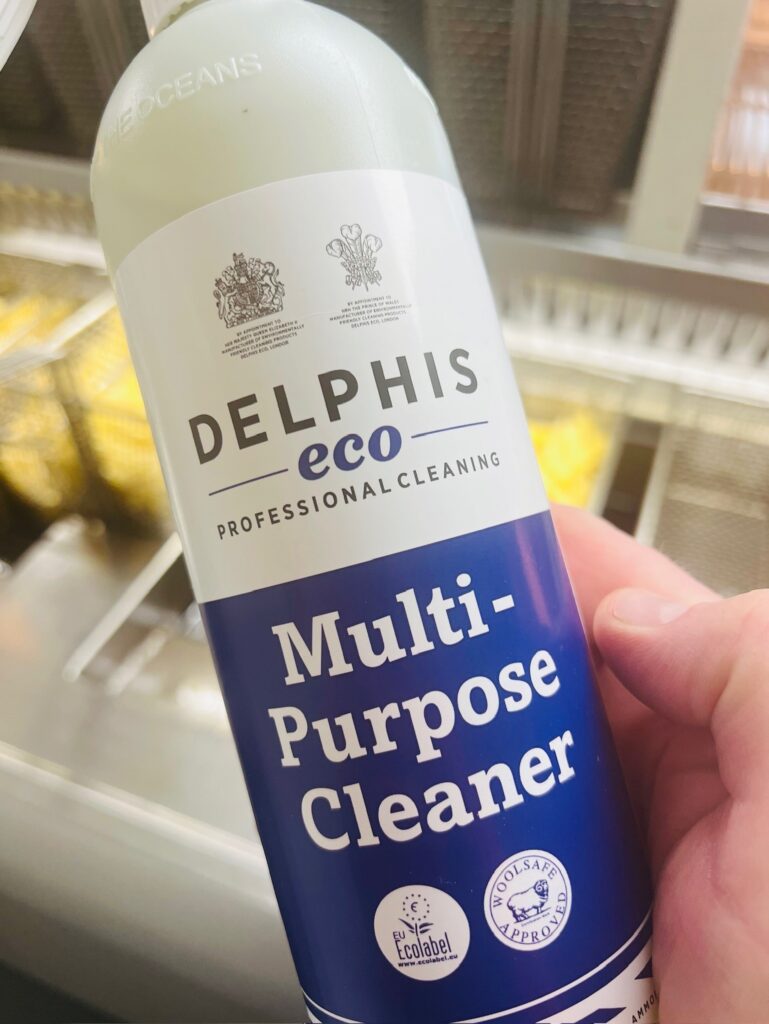
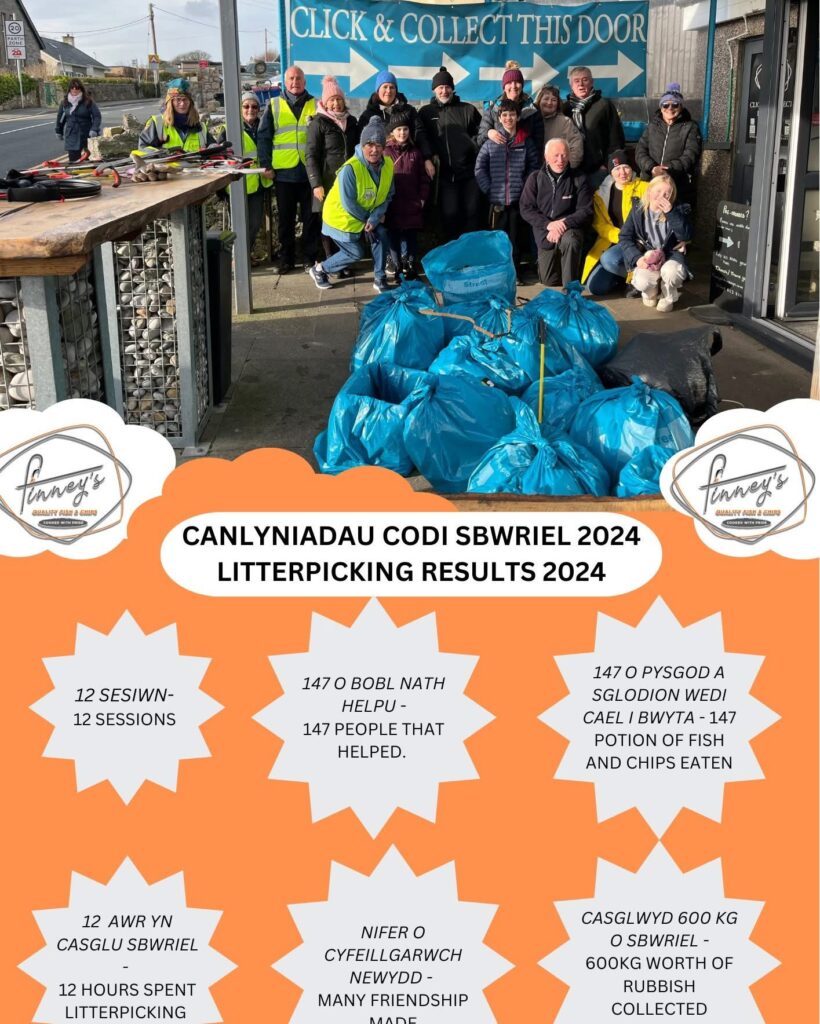
Carbon footprint
Wanting to learn where else it could reduce its environmental impact, Finney’s carried out a calculation of its carbon footprint last year in partnership with its range supplier KFE. A number of variables were measured from gas and electricity usage, to where they source their ingredients from, to how staff travel to work. “While our footprint wasn’t high, we knew we could improve it,” says Carol.
Since then, Carol has made changes to the shop’s deliveries and stock management. “As well as the fresh fish shop, we have another chip shop, Port Chippy in Amlwch,” she explains. “Previously, one of the staff members would come here daily to pick up what she needed. We’ve now got a new inventory system which means she can see what stock we have, what we are running low on and what we need to reorder. This means she only needs to come once a week. That alone has cut our carbon footprint.
“The new system is also a tool to reduce the amount of stock that we have in our freezer, to make sure that we don’t overstock. If your freezers are overly stocked, they are working harder, which means you’re using more energy.”
Energy efficiency is a key priority at Finney’s. It uses LED lighting and automatic sensors in storerooms and bathrooms, which reduces its energy usage and, in turn, bills. To cut down on paper use, it has replaced paper tickets with digital kitchen screens and offers customers the option of an e-mail receipt at checkout. Additionally, smart plug-in monitors track energy usage, ensuring appliances operate efficiently. “We’ve proven that turning off a small fridge overnight in winter saves more energy than keeping it running, which ultimately reduces costs for the business.”
Carol dreams of going further, adding: “If I had a big pot of money, I’d invest in solar panels. I already have them at home, and they’ve been brilliant. Our shop has a big flat roof – perfect for solar panels.”
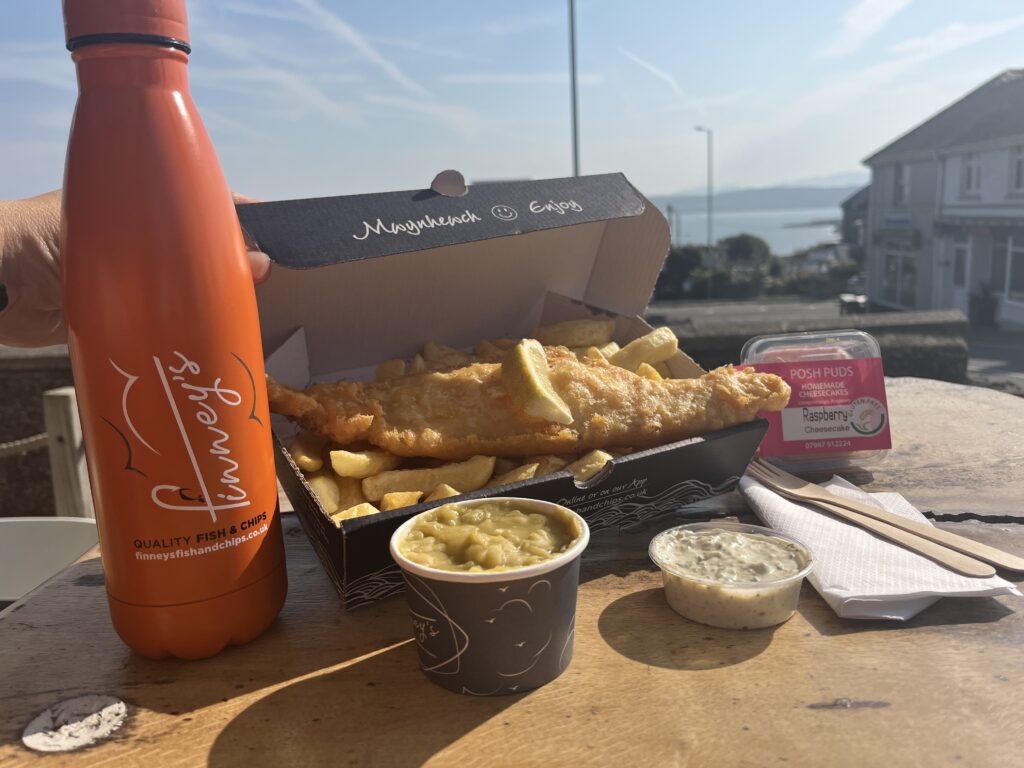
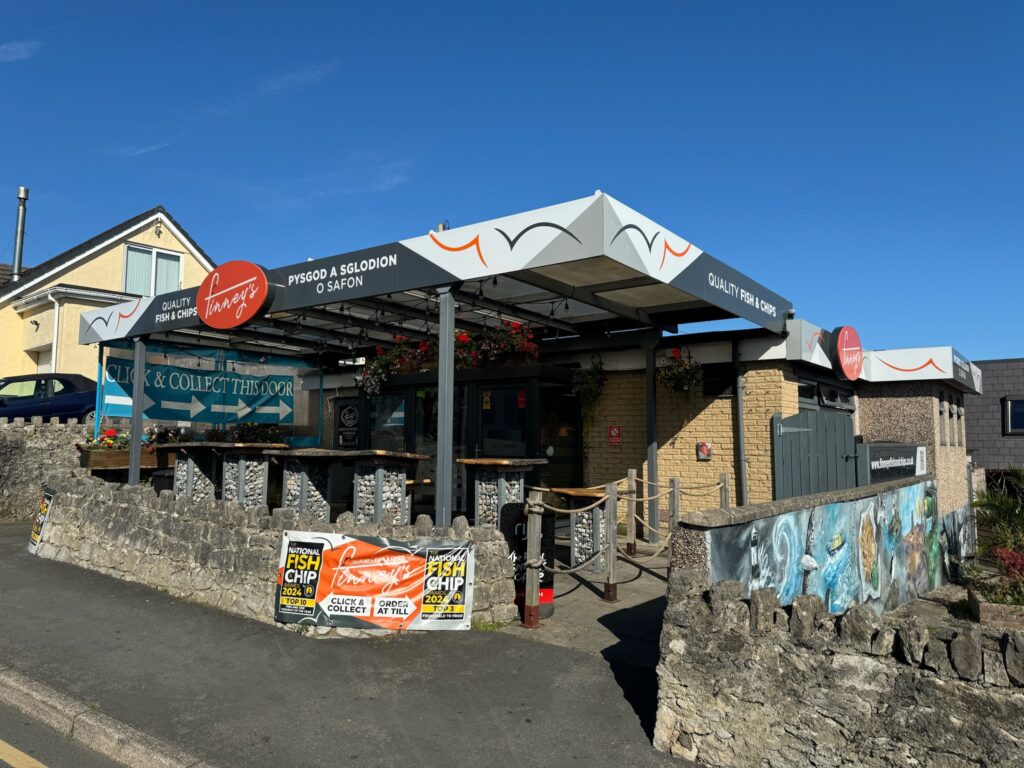
One of the biggest successes of Finney’s sustainability journey has been its monthly litter-picking sessions which engage the community. Carol comments: “It started in 2024 with nine people, and the last session had 29. As a thank you, we give volunteers fish and chips, pie chips, chips and sauce, whatever they want. I’m seeing more kids joining in which is great as it’s the younger generation we need to educate on keeping our area clean.”
All these elements culminated in Finney’s winning the Environment & Sustainable Business Award in February, an unexpected moment for Carol. “I didn’t expect to win,” she admits. “It just naturally happened. I thought, right, I’m going to do this, enter the awards, and see what happens. It turns out, we won!”
While the shift to more sustainable operations has required significant investment by Finney’s, it has also led to cost savings, allowing many initiatives to pay for themselves.
For other businesses looking to become more environmentally conscious, Carol offers this advice: “Start small. Don’t try to do everything at once. Get your community and team involved. Get ahead of legislation – separating food waste will become mandatory for smaller businesses in England by 2027, but why wait? Little steps make a big difference.
“If everyone does a little, it will help a lot.”






